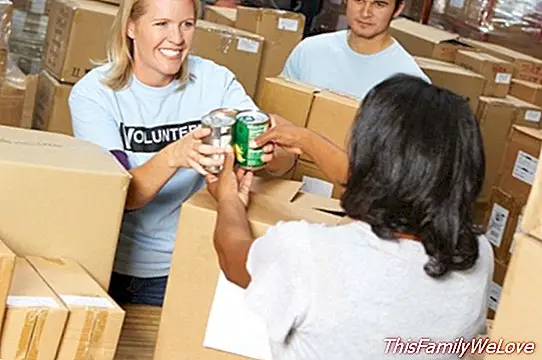Food Bank: a kilo of food, a million thanks

Do you have any idea of the amount of food that we waste at the end of the year? We are not talking only about the food that remains on the plate when we are about to burst, but about the kilos of meat, fish, vegetables or cereals, which supermarkets are forced to discard when they are about to expire.
For this reason, the European Commission, through the publication of Parliament's Resolution on the Milan Expo 2015, echoes this reality. The debate is gathered on this occasion under the title of Feed the planet, Energy for life. From the estimates made by the European Commission set out in this document, worrying conclusions are drawn:
- 30 percent of food is lost or wasted
- This is equivalent to about 89 million tons of food
- What is 179 kg of annual per capita loss
- If preventive measures are not taken, by 2020 this amount will increase by 40 percent
- We will reach 126 million tons in just five years
The fundamental role of Food Banks
On the occasion of the celebration of World Food Day Last October, the Food and Agriculture Organization of the United Nations, better known as the FAO, wanted to make an appeal from its headquarters in Argentina. The representative of the Organization in this country, Dr. Valdir Welte, stated in his speech that "the food banks, through their mission and their actions, help to reduce hunger, malnutrition and food waste" .
In relation to the words of Welte, it is worth clarifying that the terms malnutrition and hunger are not synonymous. FAO defines the latter as chronic malnutrition, with malnutrition itself lacking sufficient food for a person to meet their daily minimum dietary needs.
To which countries can we help through the Food Banks?
We do not have to go far to see how palpable this malnutrition is. In fact, there are 54 countries that this year appear on the list of LIFDCs (low-income countries with food deficits). Of those 54 countries, 36 are Africans but Haiti, Honduras and Nicaragua are also on that list. It also contains many places in Asia. See, for example, Nepal, Syria, Korea, India or Afghanistan, to name just a few examples.
In Spain too, the crisis has increased cases of malnutrition. For this reason, many times when we collaborate in initiatives such as the classic Operation Christmas Kilo, we are not only helping people from other countries but also many other people who are not so far away. According to the Food Bank of Madrid, there are about 300,000 people in need only in the capital. It takes 20,000 volunteers this time to collect approximately three million kilos of food.
The Food Bank launches its campaign
The Operation Kilo of this organization will take place lDays 27, 28 and 29 November and the registration period for both volunteers and organizers is now open. Through the website of the Food Bank we can access an interactive map to select the area that best suits our needs in terms of mobility. If you want to participate, do not delay because, although 1,000 donation points have been enabled in the Community of Madrid, and they are also very numerous in other autonomous communities, there are already many municipalities with all the places covered. You have to know that, when you sign up, you are not committing to collect and classify food during the three days of the campaign. It is enough to dedicate four hours of your time to this solidary activity.
Last year, more than 15,000 kilos of food were distributed, which helped more than 160,000 people through 536 charities. Can you imagine everything we could do this 2015? The goal is to increase the number of people assisted by 15 percent.
You can propose to collaborate with the Food Bank in ...
- Your business: in 2014, 365 companies from the food industry and 500 companies and institutions with activity in different sectors participated
- The school of your children: Last year 200 schools and educational entities wanted to collaborate
- Your house: 18,000 people participated, also in 2014, occasionally through different events. To that figure are added the 316 permanent volunteers of the Food Bank
What foods can we donate?
The organization collects non-perishable food and puts the following as an example:
- Oil
- Tin cans of meat and fish
- Baby food (milk powder)
- Pasta
- Flour
- Sugar
For the Food Bank a kilo of food is equivalent to one million thanks, and this is what we can pass on to our children, who are usually very excited to collaborate in this type of initiative. Go with them to the supermarket and explain that the kilo of rice they carry in their hands will make Christmas easier for other children like them, an action that overflows with positive values. There are many ways to collaborate and the Bank is always open to new proposals. The imagination is rewarded and of course all signs of hope. Our children are for us the greatest and we have the duty to educate them in solidarity.
Elisa García




